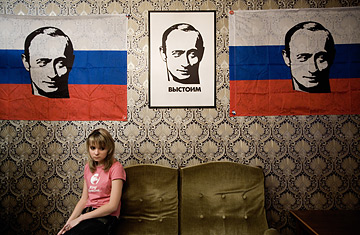
A female member of VV fan club of the Russian president, Vladimir Vladimirovich Putin, sits in a room in Moscow.
(4 of 6)
For a thousand years, Russia had no concept of a church and a state that could be easily separated. Rather, there were just two branches of the church: the government and the priesthood. God anointed the Tzar, and those who followed God were to follow the Tzar. At the Voznesensky Orshin convent, built near a well where the mystic Savvatie cured the sick 600 years ago (I drank the water, and it works wonders, at least for hangovers), the cult of Tzar Nicholas II is resurgent. "The Tzar and his family lived their lives as Christian icons," said Sister Varsofonia, who joined the convent after leaving a career in Moscow. Another nun chimed in, "He was like an instrument in the hands of God." After the Bolsheviks slaughtered him and his family in 1918, Nicholas II, Emperor and Autocrat of All the Russias, became known to the faithful simply as Nicholas the Martyr.
Putin has been keen to capitalize on this perfect circle of faith and obeisance. He famously won over George W. Bush with his religious testimony, and he has done the same at home, profiting greatly from being the first believer to lead Russia since the Tzar. "Of course you need a leader who prays," said Sister Varsofonia approvingly. "All power comes from God."
Who Needs Freedom?
In politics, though, that reverence becomes resignation. Russians are turning inward at the very moment that the Kremlin is mounting a brazen power grab. Governors are no longer elected, just appointed by the President. Opposition leaders are harassed with new antiterrorism laws. Putin's United Russia Party won a grossly uncompetitive election on Dec. 2. By and large, the Russian people offer little protest.
This raises an old question: Do Russians really want to be free? Russians are, after all, the people who actually begged Ivan the Terrible to return to rule them after he threatened to abdicate. As Radischev put it, Russians "come to love their bonds."
These bonds — and their modern equivalent, Putin's paper-thin democracy — are increasingly seen as not only tolerable but also intrinsically, uniquely, gloriously Russian. The Kremlin and its backers use new catchphrases like sovereign democracy to intone that they have their unique form of freedom. The West just wouldn't understand. Russian exceptionalism is an old argument, with an equally long history of detractors. As the philosopher Nikolai Berdyaev lamented during the bloody Bolshevik Revolution, "Russia has its own mission, [but] we have mistaken our backwardness for a point of excellence, as a sign of our high calling and our greatness."
Russians are still looking for greatness, on their terms. It's easy to see why, after the humiliations of the 1990s, when Harvard M.B.A.s flooded Russia, preaching Western-style democracy and capitalism, only to let a small cabal of criminals bleed the country dry. Oil wealth and political stability have allowed Russia to dust itself off, send the foreign consultants packing and go about looking for its own values. At the Voznesensky Orshin convent, the dorm used to house only homeless girls and orphans. Now, increasingly, the girls come from well-off families that want them to have a traditional spiritual upbringing and education. In Torzhok, a girls' boarding school has begun teaching needlework as a primary subject, not just because it's a marketable skill but also because, in the words of the headmistress, "girls will be better mothers and wives if they learn domestic skills like sewing and stitching, as it was in the old days." In Kronstadt, the legendary island fortress that staged the last armed uprising against the Bolsheviks, Putin was on hand in 1994, as vice mayor of nearby St. Petersburg, to reopen the former imperial Kronstadt Naval Cadet Academy. There, boys as young as 10 live in barracks, wear tzarist-era uniforms and sing hymns of the Imperial Navy. These are the future leaders of Russia's nuclear fleet, and they will have been inculcated largely with prerevolutionary ideals.
A similar nostalgia informs the unsubtle Moscow ad campaign of Anton Ryabinin's real estate company, Good Fortune: "Now you, just like the landed gentry of Imperial Russia, can buy your own village!" Ryabinin can negotiate the sale and development of entire settlements, houses and all, whether or not people are living in them. Standing next to a half-collapsed wooden home in Syekirino, a mostly abandoned village near Tver, Ryabinin outlined what a client might be able to do with the land: build a colonnaded manor tucked into the forest's edge and new housing for a dozen peasants closer to the road. By the river, there's room for a formal English garden or maybe a promenade. "I don't sell real estate," he said. "I sell heritage." The Russian nobleman and his country home were the center of intellectual and economic life, he explained. Villagers were happy. To Ryabinin, there is no higher calling than helping Russia's new aristocracy re-create that community, casting themselves as the barons of old.